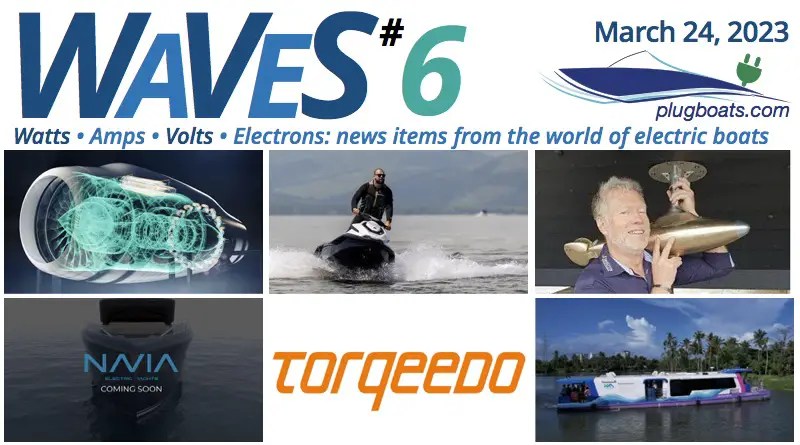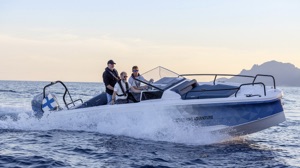WaVeS #6: Electric boat news and updates
Plugboats WAVES (Watts, Amps, Volts, Electrons) is an occasional collection of electric boat news and electric boating items that we have written about before and are updating, or items we are going to write about but are waiting for more information / developments – or items that are just tidbits you might find interesting.
So without further ado, here is WAVES #6, with electric boat and boating news about:
- a Gussies winner sourcing power from a solar farm
- Torqeedo sales for 2022
- a new electric boat business concept from Navia Yachts
- electric SeaDrive motors on a Viking replica sailing ship
- Rolls-Royce’s successful hydrogen engine test
- $45.1 million for electric jetski maker Taiga Motors
Gussies Winner to source power from solar farm
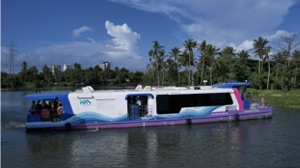 The Hindu Times reports “Stakeholders are all set to finalize the location for a 92-acre solar farm to source 17-MW of clean energy to propel the electric ferries of the ₹747-crore (≈$83M / €77M) Water Metro project. One of the boats in the project, Water Metro 1, was the 2022 Gussies winner in the category Electric Boats for Paying Passengers – In Operation.
The Hindu Times reports “Stakeholders are all set to finalize the location for a 92-acre solar farm to source 17-MW of clean energy to propel the electric ferries of the ₹747-crore (≈$83M / €77M) Water Metro project. One of the boats in the project, Water Metro 1, was the 2022 Gussies winner in the category Electric Boats for Paying Passengers – In Operation.
The article also says that “Additionally, the power generated from the Water Metro’s proposed solar farm will cater to the energy requirements of 38 ferry terminals that will be spread over the 76-km route distance that the 78 air-conditioned ferries will operate in.”
Officials say “The energy from the solar farm will be fed into the grid in return for as much energy to power the ferries, terminals, and allied infrastructure. Excess power, if any, will be sold to the Kerala State Electricity Board. Our aim is to ensure that the Water Metro project is green end-to-end, rather than ‘greenwashing.’ This will in turn prompt tourists and others who value low-carbon footprint to use the ferries.”
Torqeedo sells 53,000 units in 2022, +32% for the year
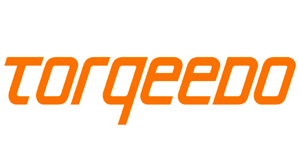 Deutz, the international engine manufacturer that purchased Torqeedo in 2017, just released their annual report for 2022. It outlines their corporate strategies moving forward and reports on last year’s operations:
Deutz, the international engine manufacturer that purchased Torqeedo in 2017, just released their annual report for 2022. It outlines their corporate strategies moving forward and reports on last year’s operations:
“The Dual+ strategy adopted by DEUTZ at the start of this year encompasses both the optimization of its existing core business in internal combustion engines and the development of new zero-emission products. The two segments will be supported through the global expansion of the service business.”
“DEUTZ is taking a fundamentally technology-open approach to the further development of its climate-neutral product portfolio in the Green segment. This means improving the carbon footprint of the internal combustion engine, for example through the use of hydrogen or synthetic fuels, and developing alternative drive systems such as electric drives.”
“With a total of 234,682 units sold, the DEUTZ Group registered an increase in unit sales of 16.6 percent in the reporting year. Within this total, the number of DEUTZ Classic engines sold rose by 12.7 percent to 181,268. The DEUTZ subsidiary Torqeedo sold 53,414 electric boat drives, which was 32.2 percent more than in the previous year.”
The full Deutz Report can be found »»here
NAVIA Yachts closes €250K seed round for e-boat rental concept
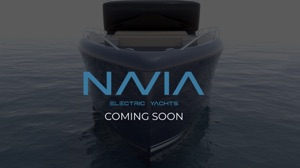 Italian startup NAVIA Yachts has closed a €250,000 funding round to begin producing electric inflatable boats with a unique business model focussed on boat rental companies.
Italian startup NAVIA Yachts has closed a €250,000 funding round to begin producing electric inflatable boats with a unique business model focussed on boat rental companies.
Boat rental companies like the idea of electric, but struggle with the high initial costs and have concerns they may need to adjust navigation routes – ultimately affecting the customer experience.
Navia Co-Founder and CEO Guglielmo La Via said: “Currently, there is no adequate infrastructure to enable a customer to purchase an electric boat, which is why we want to position ourselves in the rental market. Our research shows that people would like to try an electric boat before buying. Through our unique B2B rental model, we can introduce our boats to a wider audience and accelerate electric adoption rates in the boating industry.”
Navia plans to provide a turn-key solution for established rental companies, providing inflatable boats on loan, a charging WALL BOX for the boat slip, management software, maintenance, and 24/7 assistance for €500 per day.
The inflatable boats are being produced in conjunction with Italian shipyard CNC and Evoy motors. Sea trials are set to commence in Q2 of this year with the first inflatable boat and charging station based in Cala Galera marina, on the west coast of Italy.
Innovative SeaDrive electric motor powers Viking ship
 Norway’s Oseberg Viking Heritage Foundation ran into an unexpected challenge when they decided to build ‘Saga Farmann’, a copy of the Klåstad sailboat discovered in 1970 that is considered to be Norway’s fourth Viking ship.
Norway’s Oseberg Viking Heritage Foundation ran into an unexpected challenge when they decided to build ‘Saga Farmann’, a copy of the Klåstad sailboat discovered in 1970 that is considered to be Norway’s fourth Viking ship.
The goal was to sail the new boat from to Istanbul and back in the summer of 2023. However, as the project’s manager, Lars Bill told Anders Moen Kaste of Norwegian website Forskning.no, “An open wooden ship, built as it was done in the Viking Age, can’t be approved as a passenger ship outside Norway’s territorial waters. In order to be allowed to travel on Europe’s waterways, you must have your own engine power on board.”
The Foundation knew they didn’t want to foul up their creation with an old, smelly diesel motor. “We wanted an environmentally friendly variant with electric propulsion” says Bill.
As luck would have it, Construction Manager Jan Vogt Knutsen and his team had the Saga Farmann out for a test sail on a local canal one day when a gentleman named Finn Limseth wandered by and asked what they were up to. Limseth mentioned that he is the founder and part owner of SeaDrive, whose innovative multi-configuration electric motor was nominated for a DAME Design Award at METSTRADE 2019.
Knutsen said, somewhat jokingly, “Then you are the right people to create a specially adapted electrical operating system for us.” . But it was no joke for Limseth. He picked up the ball and invited those involved in the Oseberg Foundation to a meeting.
The shipbuilders needed an electric propulsion solution that would be totally hidden, so as not to spoil the authentic look of the boat, could turn the boat 180 degrees and would be operated with a joystick.
For Limseth, it was the ideal project for SeaDrive to play with.
After some custom work to attach 4 SeaDrive pods to the hull – one in each quadrant – and make sure the batteries and other electronics were hidden from view, Saga Farmann was ready for a trip along the Telemark Canal.
The pods are capable of rotating 120 degrees, and although the joystick wasn’t ready for the test, everything performed perfectly, even with manual steering. The joystick is now installed and the Viking ship is ready to set sail to Istanbul as planned on April 29.
Rolls-Royce’s hydrogen combustion yacht engine
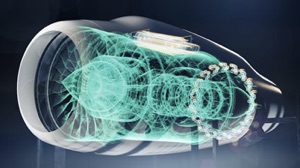 Rolls-Royce mtu diesel and gas engines are used in many large yachts and ships. mtu stands for Motoren-und Turbinen-Union, a company R-R acquired in 2011. They have already delivered more than 1000 mtu engines to Sunseeker Yachts, with more on order.
Rolls-Royce mtu diesel and gas engines are used in many large yachts and ships. mtu stands for Motoren-und Turbinen-Union, a company R-R acquired in 2011. They have already delivered more than 1000 mtu engines to Sunseeker Yachts, with more on order.
Since the acquisition Rolls-Royce has focused on making mtu engines as fuel efficient as possible while also developing ways they can run on alternative fuels.
Now the company has announced that they have successfully powered a 12-cylinder gas variant of an mtu engine with 100 percent hydrogen. The company says that with green hydrogen, these mtu engines can be operated in a CO2-neutral manner and for gas engines already installed, Rolls-Royce will offer a conversion solution.
You can read the whole Rolls-Royce news release »» here
Taiga Motors closes $40.15 million
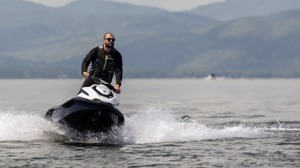 Canadian electric jetski maker Taiga Motors has announced it has successfully closed a private placement of $40.15 million.”
Canadian electric jetski maker Taiga Motors has announced it has successfully closed a private placement of $40.15 million.”
The announcement includes a lot of small print type information about the terms of the deal, but bottom line is that it will be used to pay expenses for 2023, including those for “additional manufacturing capacity and for the procurement of tooling and molds as well as expenditures on manufacturing equipment and facilities”.
Samuel Bruneau, Chief Executive Officer and Co-Founder of Taiga Motors, said “Taiga’s Nomad snowmobile and Orca personal watercraft have proven to be a success with our customers and the innovative technology behind them has led to multiple prestigious accolades in their first year of production.
“These funds will help drive our vision and allow us to invest in our production ramp-up, secure our supply chain and maintain our operations as we build the next generation of off-road and on-water electric vehicles.”

